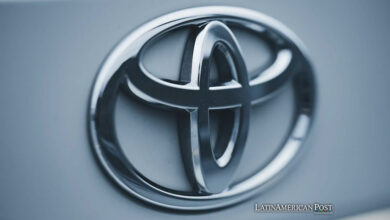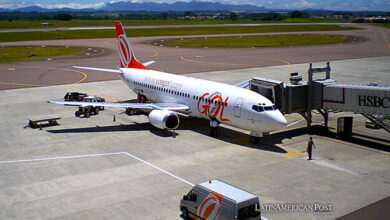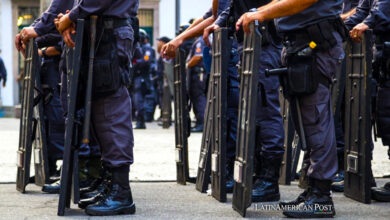Lula and Scholz promise “not to give up” and continue promoting EU-Mercosur negotiations
At a crucial high-level German-Brazilian meeting, Brazilian President Luiz Inácio Lula da Silva and German Chancellor Olaf Scholz addressed the complexities of the EU-Mercosur trade deal amid global economic uncertainties.

04/12/2023.- Brazilian President Luiz Inácio Lula da Silva (l) and German Chancellor Olaf Scholz (d) pose during a press conference part of the second German-Brazilian government consultation at the Chancellery in Berlin (Germany). EFE/ Clemens Bilan
EFE
Listen to this article
Leer en español: Lula y Scholz prometen “no rendirse” y seguir impulsando las negociaciones UE-Mercosur
Their determination to finalize the agreement, despite long-standing obstacles and a decisive upcoming Mercosur summit in Rio de Janeiro, highlights a significant moment in international trade negotiations.
The Brazilian president, Luiz Inácio Lula da Silva, and the German chancellor, Olaf Scholz, chaired this Monday the second edition of the German-Brazilian high-level consultations, which were held under the sign of turbulence in the negotiation of the EU trade agreement -Mercosur.
Both leaders indicated in the subsequent press conference that "they will not give up" and will try to convince all the parties involved so that the pact, which was initially scheduled to conclude before the end of the year, can be saved.
The summit of Mercosur countries next Thursday in Rio de Janeiro will be a "decisive" moment, said Lula, who expressed the hope that "the EU will decide whether or not it is interested in agreeing."
Willingness to compromise
"I will not give up before having spoken with all the presidents," said Lula, who stated that after 23 years of negotiation "it would be unreasonable" not to move forward with the agreement.
Adding to the difficulties involved in the transfer of power in Argentina is French reluctance, said Lula, who according to him has a long tradition related to the political interests of French farmers.
Scholz, for his part, asked for "the greatest possible pragmatism and willingness to compromise" from all those involved, since the conclusion of the agreement would be, in his opinion, "a great advance."
At the same time, he expressed his conviction that if the European Commission (EC) manages to complete the negotiations, there will be no difficulties for the Council of the EU and the European Parliament to ratify what has been agreed.
"I am convinced that there will be a majority in both institutions," he stated.
German economic sector urges agreement
The German economy and industry took advantage of Lula's visit to highlight Brazil's "potential" as a trading partner and to urge the conclusion of the trade agreement with the bloc of countries formed by Brazil, Argentina, Uruguay, and Paraguay.
The president of the Federation of German Industry, Siegfried Russwurm, urged politicians to move forward with "flexibility and willingness to compromise" towards signing the pact before the end of the year.
Read also: Brazil Takes OPEC Observer Role to Balance Oil and Climate Goals
He highlighted that with this agreement, the EU and South America will be able to create "the largest commercial area in the world, with more than 720 million people, which will cover almost 20% of the world economy and more than 31% of global merchandise exports".
Also, the president of the Latin American Initiative of the German Economy (LAI), Ingo Kramer, warned that if there is no agreement before the end of the year "there is the danger that this will become a 'neverending story' (in English, a never-ending story)
Kramer warned that other actors such as China are more than willing to fill the "vacuum" that may result and that "the big loser" would be German export companies.
Progress and sustainability
As part of the consultations, Scholz and Lula signed an agreement to deepen cooperation between their countries in areas such as the economy, renewable energy, sustainable development, climate protection, and the fight against hate and misinformation, among many others.
The declaration of intent encompasses, according to Scholz, a "dozen" sectoral agreements in the preparation of which various ministries participated.
Germany aspires, according to the chancellor, to help Brazil achieve objectives such as zero deforestation until 2030, climate protection and research, and other environmental goals, which he stressed can only be achieved if "social justice" is guaranteed at the same time. and jobs are created.
An important area is renewable energy, where one of the goals is to "connect Brazil's potential with Germany's interest in green hydrogen so that everyone benefits."
Berlin also wants to "strengthen local value-added production chains," he added, while issues such as mobility and migration were also addressed, given Germany's need to import skilled labor.
A reform of global governance
Lula and Scholz also spoke about current international issues such as the war in Ukraine and the Israeli offensive on Gaza.
In this context, Lula stated that his Russian counterpart, Vladimir Putin, will be invited to the G20 summit next year and if he travels to the South American country he will have to face the consequences of the arrest warrant issued against him by the International Criminal Court (ICC). ).
"He may or may not be arrested if he comes," he stressed. "That cannot be decided by the head of state, but by Justice.
Lula also took the opportunity to criticize the role of the United Nations in relation to the Israeli bombings of Gaza, since "it does not fulfill its role", and called for a reform of global governance, an issue that he intends to address during the next Brazilian presidency of the G20.
Scholz supported the Israeli right "to self-defense", but asked Tel Aviv to "strive to avoid civilian casualties" and called for a "substantial and lasting" improvement in the humanitarian situation in the enclave.




